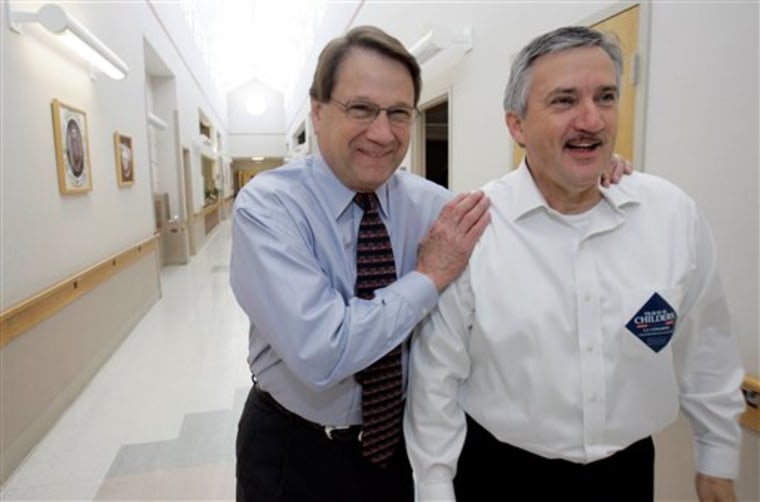On a recent Saturday afternoon in small-town northern Mississippi, a little-known conservative Democratic congressman went door-knocking and restaurant-hopping as if his own career were at stake.
He was campaigning for Democrat Travis Childers, who went on to win the GOP stronghold in a special election a few days later.
"Hell, I wouldn't do this for myself," Rep. John Tanner, D-Tenn., who has served in the House for two decades, told Childers of the door-to-door effort.
That's only partly true.
Pragmatists vs. ideology
Tanner and "Blue Dog" Democrats — conservative fiscal hawks "choked blue" by their party's liberal flank — are building their own political operation to propel like-minded candidates to victory this fall. They're also quietly raising their own influence within a party personified by liberals like Sens. Edward Kennedy and presidential candidate Barack Obama and House Speaker Nancy Pelosi.
In a year when Republicans are facing an exceedingly tough political climate, the small but determined band of centrists sees an opportunity to turn more GOP districts over to Democrats.
"The Blue Dog philosophy is catching on in a lot of the country," Tanner said in an interview in the Capitol. "The American people are looking for pragmatists rather than ideologically driven candidates, and they want people who pledge allegiance to the country first and to a political party second."
Added Charlie Melancon, D-La., "The candidates who can win now are the ones that are like us."
The clearest sign they may be right: the recent victory of pro-gun, anti-abortion Childers in a district President Bush won by 25 percentage points in 2004. That came just 10 days after a special-election win for Democrat Don Cazayoux, a lawyer and state representative, in a similarly conservative district in southeastern Louisiana that Republicans had held for three decades.
Blue Dog success
"Democrats are basically running as Republicans," shrugs Rep. Tom Cole, R-Okla., the head of Republicans' congressional campaign arm. Cole said the Blue Dog strategy boosts candidates who are "running away from their party and running away from their national nominee."
If they're successful, Cole said, the conservative Democrats could be in a tough spot next year, trapped between their districts and a liberal Democratic president and congressional leadership. "You can't say you're pro-life, pro-gun, want to cut taxes and control spending, and vote for Nancy Pelosi as speaker."
That dilemma has already flared on Capitol Hill. Blue Dogs recently blocked Pelosi's plan to tack a multibillion-dollar GI education benefit onto an Iraq war spending bill without paying for it, thus adding to the rising deficit. The conservative revolt within their party forced Democratic leaders to cancel a vote on the measure and add a tax surcharge on millionaires to finance the program.
"Sometimes we stand between (Democratic leaders) and the rest of the caucus that wants to do every program in the world and not pay for it," said Allen Boyd, D-Fla., who joined Tanner and Melancon campaigning for Childers. Of the recent Iraq measure, Boyd said, "We put our foot down and said, 'You know, if you don't pay for it, we're not going to help you with our votes.'"
Moving toward the center
The group's name is a play on yellow dog Democrats, a moniker that emerged in the 1920s to describe party loyalists in the South who, it was said, would vote for a yellow dog if it ran on the Democratic ticket. Right-of-center Democrats banded together and took on the current name after Republicans swept control of the House in 1994.
The 47-member coalition gained considerable traction in 2006, when the victories of its 11 freshman members — sometimes called Blue Pups — over Republican incumbents in conservative districts helped hand Democrats control of the House. Party leaders have been forced to tailor their agenda to some degree to the group's centrist views, particularly when it comes to budget and spending matters.
The coalition has more than enough members to deprive Democrats of the votes they need to push through any piece of legislation over Republican objections, particularly given the party's slim margin of control — they control 236 seats to Republicans' 199.
Lending support
While the party's congressional campaign arm recruits candidates, strategizes and raises the lion's share of money for House races, the Blue Dogs are running a mini-campaign committee of their own. They've raised $1.8 million through their political action committee — the most of any leadership PAC — and plan to give the maximum $5,000 allowable by law to all their members and those they've endorsed, as well as their members' and prospects' state parties.
They also are providing crucial on-the-ground help to candidates they back. Besides Cazayoux and Childers, the coalition has endorsed three other Democratic challengers in Republican districts: Jill Derby in Nevada, Christine Jennings in Florida and Elwyn Tinklenberg in Minnesota. They're also backing Rep. Harry Mitchell, D-Ariz., who isn't a member of the coalition, and anticipate making more endorsements as Election Day draws nearer.
The Blue Dogs still face considerable odds. Their members are by definition vulnerable to campaign challenges in the swing districts they represent, and many of them — particularly the Blue Pups — are facing steep fights to hold onto their seats.
Nonetheless, Democratic leaders welcome their help despite the fact that the candidates Blue Dogs cultivate are likely to complicate appeals to the party's liberal base.
"At the end of the day, it means more people supporting our agenda," said Rep. Chris Van Hollen, D-Md., his party's congressional campaign chief. "If you have a Republican in that seat, you don't get a vote on any issue. If you have a Democrat, you have an opportunity at least to get their vote."
